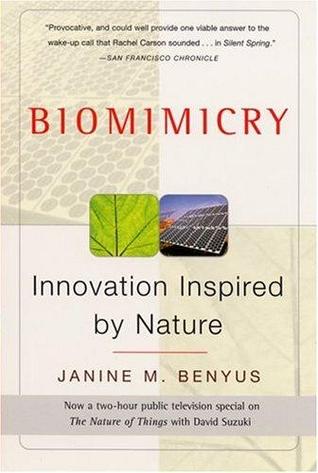

 |

|

The average rating for Biomimicry based on 2 reviews is 3 stars.
Review # 1 was written on 2020-01-10 00:00:00 Benjamin Curtis Benjamin CurtisI adore nature and science should do the same to get behind all those secrets and abilities shaped by evolution. The sheer speed of technological progress, that leads to the unleashing of faster and faster scientific insights, has already confirmed and refuted some of the ideas of this already over 20-year-old book, but the future will show if the new results won´t have to be reconsidered again. And again. And... It is simply logical long-time, less economic, thinking to focus on the use of up to billions of years old nature concepts instead of generating fictional trillions of cash and messing the whole earth system thing up. Just by copying prototypes that showed to be successful in million-year long evolutionary arms races and adapting the function to the wanted field of application and bingo, time, money and probably the planet are saved. The author shows some examples of how she believes nature might inspire us in the future, taking real nature examples that are just the tip of the iceberg. Spidersilk or natural adhesives used by mussels have manifold potential and there are vast quantities of both undiscovered wonder substances and potential purposes. Like instinctively finding cures like chimps, elephants and many other animals that are, in unknown ways, capable of consuming the foods they need in certain situations in the right amounts. Copying and understanding the chemical structures and possible applications of all those plants and fungi could be the key to finding cures for many diseases and even the aging process. "Energy harvesting like a leave" shows the potentials of photosynthesis and in this way, alternative energy in general. Because there are so many processes that could be made useable, especially chemical ones that run 24/7 for energy production by optimizing physical processes. "Running a business like a redwood forest" is a bit romantic, but comprises the main ingredients for a sustainable and fair economic system without losers. "Computing like a cell" has already become a big topic and seemed close to impossible when the book was written, but is now already in its´starting block. It will be interesting which of the three contestants, old school computing with circuities that are getting closer and closer to the nanoscale, quantum computing or biological DNA- or another kind of nature-inspired or "alive" computing may become the most effective one. And that is just the hardware, the algorithms that could be won by copying nature and its creatures are also full of potential. There are not only the technological and economic applications, but the military ones too that could be especially useful with new technologies and spaceflight so that it might be that we will find the way to other worlds by copying the processes that made our life, the functioning of our bodies, biospheres, everything around us, possible. A wiki walk can be as refreshing to the mind as a walk through nature in this completely overrated real-life outside books: |
Review # 2 was written on 2011-03-20 00:00:00 Kenneth Walsh Kenneth WalshI want to like this book, and I agree with her underlying theses. I enjoy reading all the gee-whiz almost-there projects that are going to supplant petroleum-based agriculture, energy, and the like, any day now. But no matter how many stories she tells about projects that *could* be better than what we use now, she never seems to touch on the fundamental problem that we, as a species, use all the food and energy we produce, so anything that is going to replace that needs to have the same productivity as the processes it's replacing, and natural, nature-imitating processes live by the same rules, only making just about as much as they need. Foodstuff and energy production that support humans require a vast excess, because we are, fundamentally, parasites on our foodstuffs and our energy sources, and with the population pressure we have, there aren't any natural processes that can sustain themselves and us too. This is the difficult truth: there are too many people for the world to support sustainably, given what we currently have and know. All the gee-whiz stories founder on that underlying problem, which neither she nor anyone else has any idea how to address, save the wingnuts who propose just killing all the poor and foreigners. Plus I am irrationally annoyed when I read sentences like: "mammoth wildrye... a stout cool-season relative of wheat that the Mongols used to feast on when drought claimed their annuals" -- they didn't feast. They ate wildrye because they were starving because their normal crops had failed. That wording is the sort of institutional bias that runs rampant in this book, and in many other books and magazines in the future-utopia genre, and it never fails to irritate me, in exactly the same way that the phrase "unborn people" irritates me. Science stands on its own, but choosing soothing words to support your ideas is putting the prop in propaganda. |
CAN'T FIND WHAT YOU'RE LOOKING FOR? CLICK HERE!!!